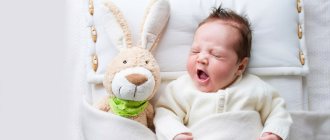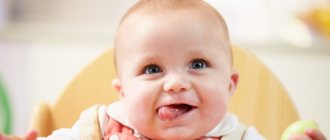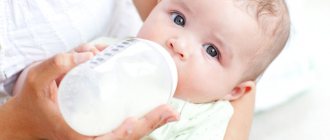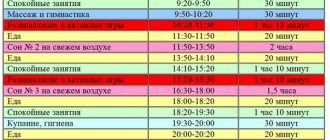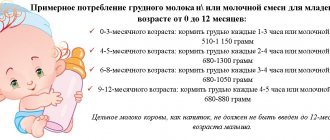Factors influencing speech development
At what month will the baby speak depends on many factors, including:
- Genetic predisposition. If the mother or father spoke relatively late, then it is likely that the child will begin to speak with some delay. This factor is directly related to the characteristics of the articulatory apparatus - it can develop both quickly and relatively slowly.
- Gender of the baby. As a rule, girls pronounce their first words earlier than boys and by the age of two have a richer vocabulary. This is due to the fact that they generally develop faster, and their nervous system is more plastic.
- Quality of the language environment. Scientists have discovered that the baby remembers his first words even when he is in the mother’s womb. The more often a child hears human speech, the faster he masters it. When parents communicate little with each other, and do not talk to the child, but only lisp, then it is not surprising if he begins to speak late, and his vocabulary turns out to be extremely poor.
- Individual developmental characteristics. Much depends on the baby’s innate temperament. Introverted children can be silent, although they understand the speech of others quite well. Whereas little extroverts begin to show speech activity relatively early.
How to develop correctly
The baby is developing quite well on its own.
Parents often wonder how their child knows this or that if no one taught him this. But nevertheless, mom and dad should constantly engage with their offspring in a playful format.
You should not try to teach him the alphabet or mathematics; you need to start with fine motor skills, simple actions with small objects, and distinguishing colors and shapes.
Initially, emphasis should be placed on physical abilities. Develop walking, jumping, climbing. This can be done in various ways:
- holding hands, giving the opportunity to walk and jump;
- allow a 1-year-old child to walk barefoot
on grass and sand; - motivate him to climb onto the bed or sofa and then get off (with the help of toys);
- while playing, crawl under a table or chair;
- play with large boxes, let the baby climb in and out;
- learn to step over objects laid out on the floor;
- throw the ball and catch the ball.
Note!
Active walks on playgrounds also help physical development.
Already at this age, you can teach your baby to climb the wall bars, climb the slide, of course, helping him. But the development of fine motor skills
requires special tools. To develop motor skills you need:
- Draw with paints and pencils, first holding them and then letting them do it on their own.
- Modeling from plasticine, salt dough and polymer clay. And not only sculpt figures, but also weave sticks and buttons into them.
- Glue
paper figures and play with stickers. Today books with animal stickers are sold, this allows you not only to develop movements, but also to teach the animal world. - Play with strings: fold the laces, wind the threads on a ball.
- Play with kitchen bowls: pour water with spoons, sort beans, pour sand through a sieve.
- Play with small objects: unscrew lids, collect matches, throw matches into a jar, fill bowls with spilled beans, play with a sorter.
- Peel off Velcro, fasten buttons, learn to close a zipper, hang clothespins on a rope.
- Fold pyramids and build towers from cubes.
It is necessary for parents to determine what to teach a child at the age of 1, because only they already know what their children can do and what they should pay special attention to.
In addition to fine motor skills and walking, you should:
- Stimulate gross motor skills by playing with large cars, balls and large toys.
- Talk constantly
, read poems and songs together. Name colors, shapes and objects loudly so that your baby can remember. - Allow you to play independently, exploring objects around you.
- While playing, act out scenes and various stories with the help of toys.
- Play in the bathroom with special toys and sand accessories.
- Listen to music and dance together.
- Play in sandboxes with shovels and rakes. Build pasochki.
- Take your little one to playgrounds where he can play with other children, developing his social skills.
- Read books together and look at photographs, calling the characters by name.
Children develop in a very natural way. They repeat everything after adults and learn to eat, drink, walk, and other things while playing. Today there are a lot of educational books and toys that help children master new tasks and gain new skills. What does a 1 year old baby need? Only the attention and love of parents.
Speech development norms from one to two years
A one-year-old baby already responds to his name, understands when he is told “no,” and actively imitates the speech of adults. He responds to requests: “sit down”, “stand up”, “take it”. He waves his hand back when he is told “bye-bye.” But his vocabulary is still small and includes only a few words (about 10), consisting of one or two open syllables: “mama,” “dad,” “baba,” “give,” “bi-bi.”
After a year and a half, the child’s vocabulary already reaches 50-60 words - and then phrasal speech begins to form. The first phrases consist of only two words. For example, pointing to his favorite car, the baby says: “Mom, beep.”
At approximately 16-18 months, the so-called “lexical explosion” occurs, when passive vocabulary becomes active. That is, the baby begins to actively introduce into his vocabulary all the words that he has previously memorized.
By the end of the second year of life, children already pronounce from 100 to 300 words and use prepositions in conversation. But the speech of a two-year-old child may not be entirely understandable to adults, since he does not retain the syllabic structure of words - he pronounces many sounds incorrectly or skips them completely. Especially if the word is difficult to pronounce and has closed syllables. But children of this age actively supplement their speech with gestures and facial expressions - this makes it more understandable for adults.
Symptoms of speech delay
The sooner parents discover that something is wrong with their child’s speech, the easier it will be to correct the situation and avoid serious consequences. Here are the signs that should alert you:
- per year: the child behaves strangely quietly, does not try to pronounce syllables, and the sounds he makes do not really resemble an attempt to speak;
- at one and a half years: the baby does not say a single simple word (“mom”, “dad”, “bi-bi”), but at best makes sounds, does not react when called by name, does not pay attention to requests;
- at two years old: the child does not speak at all or speaks very unintelligibly, and his vocabulary is limited to a few simple words.
We teach you to pronounce hissing sounds using the methods of Fomicheva and Bogomolova
Possible causes of the problem
Speech development in a baby may be slowed down for the following reasons:
- Mental disorders. They can range from minimal brain dysfunction to severe dementia.
- Hearing loss (acquired and congenital). The degree of hearing loss varies, and the stronger it is, the worse the situation with speech.
- Social factors. If parents do not care about the speech development of their child, he will speak poorly, even if he is completely healthy.
- Pathologies of the development of the articulatory apparatus. Any disruption of the functioning of the organs responsible for the reproduction of sounds is fraught with speech delay or even complete muteness.
The saddest thing is that, regardless of the cause of a child’s speech delay, it always entails a slowdown in mental development. And the longer parents ignore the problem, the higher the likelihood that the child will become mentally disabled.
Why does a child not speak at 2 years old and what to do?
Many parents are often worried if a child at 2 years old speaks very little or nothing at all. The reasons may be different:
- intrauterine brain lesions, as a result of which areas responsible for speech were damaged;
- neurological diseases;
- hearing loss or deafness;
- intoxication of the mother’s body during pregnancy due to alcohol intake, infections, which can cause alalia and general speech underdevelopment;
- mental impairment and developmental delay;
- autistic type disorders;
- pedagogical neglect and lack of adult attention;
- psychological trauma.
If at 2 years of age there are doubts about whether the child will begin to speak, then it is better to start a full examination and visit the following doctors:
- ENT. Check the audiogram for the quality of sound that the child's ear can perceive.
- Neurologist. Before the hike, it is necessary to record the age at which growth spurts and new skills occurred: he began to roll over, walk, etc.
- Speech therapist. In order to exclude pathologies of the muscles or speech apparatus at birth.
- Psychologist. It is better to visit after consulting a neurologist.
This specialist will help you find out whether there are psychological aspects to the disorder and give recommendations to parents on how to help them develop.
Basic recommendations for diagnosing the disorder:
- medical examination, as mentioned above, with consideration of specialist recommendations;
- limit viewing of cartoons, games on tablets or phones;
- talk to your child more, and communication should be included, with eye contact and active facial expressions;
- pronounce all the actions of the baby and yours, monitor the clarity of speech;
- Don’t scold if your two-year-old doesn’t speak, this will only increase the stress. On the contrary, encourage attempts to make contact with you.
Diagnosis of speech delay
A baby who is lagging behind in speech development should be shown to specialists, including a pediatrician, speech therapist, psychologist, psychiatrist, neurologist and otolaryngologist. To detect the cause of violations, the following diagnostic procedures are carried out:
Hearing test
A pediatric otolaryngologist will be able to determine whether the baby hears well. Examination and special tests not only give an idea of the extent of damage to the organs responsible for hearing, but also identify the cause of the problem (rupture of the eardrum, chronic otitis media, pathologies of the structure of the inner ear, etc.).
Parents can check their baby’s hearing on their own, at home. To do this, you need to move away from him at a distance of about 6 meters and clap your hands. Normally, the child should immediately turn his head towards the sound. If he does not react, you should come closer a couple of meters and repeat the clap. Lack of response will almost certainly indicate hearing problems.
Diagnostics of fine and gross motor skills
By observing a child’s motor activity and how he handles toys, an experienced neurologist will be able to tell how much his psychomotor development corresponds to the age norm. Special tests are also used (Denver test, Griffiths scale, etc.).
You can understand whether a child has problems with fine and gross motor skills at home. To do this, parents need to watch him for some time. Gross motor skills are developed normally if the baby:
- can back away;
- steps over small objects;
- pushes a ball with his foot;
- jumps up.
We can talk about normal development of fine motor skills if the child:
- easily places cubes on top of each other (builds a house);
- tries to catch a ball that was thrown to him;
- takes small objects with two fingers (developed “tweezers grip”);
- can break a large piece of plasticine into small pieces;
- easily places the rings of the children's pyramid onto the stand pin.
If motor skills are impaired, the baby's movements are imprecise and poorly coordinated.
Diagnostics of articulation organs
The speech therapist examines the child and assesses whether the structure of the tongue, lips, teeth, jaw and palate corresponds to the norm, and whether there are any developmental anomalies that interfere with speaking. Among such violations visible to the naked eye:
- malocclusion (when the teeth do not fit together);
- a short frenulum of the tongue, which prevents you from lifting it up;
- a very thick or, conversely, small tongue;
- narrow and high palate (the so-called “Gothic”);
Testing speech understanding
How well a child responds to words for his age can be determined by a child psychologist. But parents can also conduct a small test by asking the child:
- show different parts of the body (legs, arms, head, tummy);
- put toys in boxes;
- jump and clap your hands;
- bring any familiar thing (slippers, book, etc.).
When a child begins to speak, the norms
Speech development begins from birth. A newborn screams to attract attention. By the age of 2 months, he begins to respond to the voices of loved ones and respond to them with humming. At six months, sounds acquire an emotional coloring, intonation appears, and the mother can easily recognize from the sound what the baby needs at that moment. If something hurts, his crying takes on plaintive, offended notes, etc. At 7 months, the baby knows his name, pronounces simple syllables, learns to double them: “ma-ma,” “pa-pa.”
By 11 months, he consciously says “mom,” “baba,” and “dad,” and tries to repeat some words heard from his parents. He pronounces several simple words a year, usually with the same syllables.
You can learn more about speech development by month of a child’s life from the table below:
| Age | Speech skills |
| newborn | Scream. Based on its character, experts can immediately predict the success of speech development |
| 1 month | Stops crying when he hears a sharp sound. The scream becomes expressive |
| 2 months | Communicates with adults through a smile. Harbingers of future speech appear: guttural sounds - “mmmm”, “yyyy” |
| 3 months | In response to communication, a complex of revival appears: movement of arms, legs, loud abrupt sounds |
| 4 months | He walks for a long time, listens to his voice. Sings chains of vowel sounds: “aaaa”, “oooo”. Knows his mother's voice, smiles back at her |
| 5 months | Distinguishes the intonation of speech addressed to him. Turns his head towards the sound. |
| 6 months | Babbling appears. The consonants “m” and “b” are added to the vowel chains |
| 7 months | Imitates the intonation and rhythm of adults. Clearly pronounces the syllables “ma”, “ba”, “da”. He is wary of strangers. Reacts to his name |
| 8 months | Uses babbling to attract attention. Knows the meaning of many words, names of toys |
| 9 months | Follows simple verbal instructions. Tries to communicate with adults using speech sounds |
| 10 months | Plays learned games: “okay”. Understands the meaning of the words “no” and “yes” |
| 11 months | Shows body parts. Follows verbal instructions: moves the car, puts the doll to sleep. Expresses desires with speech: give, na |
| 12 months | Speaks his own language with toys. Has an average of 5-6 words in the dictionary |
Each child develops individually, but this table can serve as a guide to identify possible disorders.
What time do children start speaking if the first words are delayed?
1 year is the age when children begin to speak their first words. It is worth noting that speech acquisition can vary greatly: some speak meaningfully at one year of age, while others express their thoughts closer to 2 years. Most girls speak earlier and better than boys.
If by 12 months the child does not say more than one word, does not respond to music, or is unable to fulfill basic requests, it is necessary to consult a doctor. Specialists will check your hearing and vision. If not only speech but also motor development is delayed, a consultation with a neurologist is required.
Prevention of speech delay
If the examination shows that the child’s speech problems are not caused by illness, but by the fact that parents do not pay enough attention to the development of his speech abilities, it is necessary to urgently take preventive measures to prevent further lag. Here are some tips to remedy the situation:
- Spend time talking to your baby every day. Speech training should be daily.
- When talking with your child, avoid lisping and deliberately distorting sounds. In order for him to form correct speech, replace the abbreviated words “lala”, “woof-woof”, “bi-bi”, “bye-bye” with regular ones.
- Don't scold him for speech errors so that he doesn't become afraid to talk to you, but correct them tactfully and carefully.
- Read fairy tales to your child as often as possible, and then patiently and thoroughly answer all the questions he asks.
- Show interest in everything your child says, do not brush off his attempts to talk to you, even if you are tired or not in the mood.
- Don’t try to predict and fulfill his every desire - let him learn to turn to you with requests.
- Periodically ask him different questions or make small requests. For example, he will look out the window and tell you what the weather is like outside.
Speech therapy classes for children at home
Formation of speech
At first, the baby speaks his own language, which he and his close circle understand. This method of communication is called autonomous child speech - this is the first stage in speech development. It is quite unique and does not coincide with the articulation and sound composition of an adult conversation. For example, the following words: “gu-ga”, ba-bi.” The child cannot say “milk” completely, he says “mo-ko”.
After the preparatory period in the form of autonomous child speech, the real language period begins. Its onset depends on the individual characteristics of the child and genetic factors. In most cases, the formation of one’s own speech is formed by 1.5-2 years. The period is characterized by mastering correct sound pronunciation, expanding vocabulary, and using grammatical speech norms.
Child behavior at 1 year
One-year-old children are very active and spend most of the day on the move. They climb wherever they can, not realizing the danger.
There is an intensive development of behavior and habits. By this point, kids want to do everything on their own. They have a desire to walk without holding hands, and to use a spoon while eating. Restrictions lead to whims and tears. It is necessary to react correctly to emotional outbursts, to create a certain balance between prohibitions and freedom of action. Certain boundaries should be set and made clear.
If parents indulge all the whims, the child will very soon begin to perceive tantrums and foot stamping as the norm, and will use such methods of influence constantly.
Despite the formation of personality, during this period children are very attached to their parents. They cry when mom leaves and look forward to her return. Emotional and physical contact is important for them. Hug your baby more often, pat your baby’s head, and encourage him if something doesn’t work out right away.
A child begins to speak if he grows up in an atmosphere of communication
When a child does not yet speak or has a limited vocabulary, this does not mean that he understands as little. Even babies recognize the basic meaning of words by intonation. They watch the actions and conversations of adults. Therefore, you should talk to your baby as much as possible, and when communicating in his presence, be careful in choosing a topic.
It will be difficult for a child to speak if he hears very little speech. Parents need to verbalize their every action.
Tips for speech development:
- In the morning after waking up, tell your baby what you plan to do today, ask leading questions: “Shall we go for a walk today?” Give me a chance to respond.
- Teach auditory perception. Read short fairy tales, poems that attract with their melody.
- Do not force verbal contact when the child is busy or playing. Speak in a calm tone, slowly.
- There is no need to fulfill the baby’s wishes as soon as he points to the desired object while he acts up. He will simply understand that there is no need to strain and say anything, he is already perfectly understood.
- Discuss objects that are in the child’s field of vision so that he has the opportunity to touch and examine them.
- Encourage communication. Place your favorite toy in an inaccessible place, but so that he can see it, thereby provoking verbal contact, the child will ask: “Give me.”
- Look at picture books, it is better if the image is real. For example: a pink bunny will distort the idea of the animal.
- Your communication with your child should be emotionally charged: “Look, what a bright sun!”, “How beautiful you are.” A friendly tone and a smile will attract attention.
How to stimulate speech development
If the baby is silent and not very willing to make contact, or if he has difficulty mastering speech, special methods will help to increase his speech activity.
Educational games
A child from one to two years old will learn to speak faster if learning takes place in an unobtrusive, playful way. There are several types of such games:
- Role-playing. During the game, the child plays some role, for example, pretending to be a detective, if it is a game “Find a toy”. You can hide the doll from him, and he will look for it. Or, on the contrary, he hides, and you look for it. During such games, words will constantly be exchanged between you and your baby. There are also plenty of other role-playing games that can involve toys. For example, “Reception of guests”: a bear and a bunny come to visit your baby, and he must treat them to tea. Or the game “Treating a doll”: the doll has a sore throat, she needs to be warmly dressed and given medicine. You can come up with simple plots for such games yourself.
- Games with constructors. Children's construction toys perfectly develop a child's fine motor skills. Scientists have proven that one area of the brain is responsible for speech abilities and finger movements.
- Drawing. There are special coloring books for children from one to two years old. By drawing, the baby trains fine and gross motor skills. He can also tell you about what is shown in the picture - in this way not only his speech will develop, but also his imaginative thinking.
Developmental exercises
Training the articulatory organs prevents speech problems and promotes clearer and clearer pronunciation of words. Recommended exercises:
- Poems. In children's stores you can buy special books with poems for children under two years old. The parent reads the text, and the child repeats it with pleasure.
- Boutier. When a baby blows into a tube, blows soap bubbles, or simply puffs out his cheeks, his organs responsible for producing sounds are trained.
- Tongue movements. The child opens his mouth and moves his tongue left and right, pretending to be a watch, sticks his tongue out as much as possible, and then hides it again. Children are happy to repeat such simple exercises after their parents.
Only a speech therapist can determine how well a child speaks. Therefore, parents must periodically show their children to this specialist. This will allow you to notice and correct any speech problems in time.
Skills and abilities of a child at 1 year old
What should a one year old child be able to do? From six months to 2-3 years, babies actively explore the world. This is the year when you can already actively buy construction sets and toys,
which develop fine motor skills. In addition, you can read books together, watch educational cartoons and engage in other interesting activities. They themselves are interested in the contents of cabinets, drawers and bags, take apart toys and look at books.
Emotional Skills
In addition to physical development, it is important to monitor the psychological and emotional health of the baby. He must be able to smile, react emotionally to events around him, and be able to express his emotions. A 1 year old child should be able to:
- enjoy the fun events around you;
- show emotions in relation to toys: love some, discard some, be afraid of some;
- recognize loved ones and respond to their coming and going;
- find relatives in the photo and point your finger when asked about them;
- be afraid of strangers
and embarrassed by them; - look at books, leaf through them, enthusiastically look for familiar characters on the pages;
- dance to music;
- repeat the movements
of adults (talking on the phone, scolding someone); - be subject to mood swings;
- react to prohibitions (with facial expressions, screaming, squeaking);
- play with the mirror, make faces, laugh.
As you track growth, you can notice all the new emotions that the baby develops. How he reacts differently to strangers - he gets scared of them, tries to hide behind his parents, is shy, how he recognizes his acquaintances, how his mood changes. The baby is already beginning to be cunning, tests his parents for “strength”, he thinks through his actions, strives by all means to achieve his goal.
What should I say?
The baby is already actively making sounds, individual syllables, and he has words to identify mom and dad, himself and familiar objects.
A child of 1 year may not begin to speak. But he already certainly understands the words and speech that is addressed to him, distinguishes intonation.
From 2 to 10-15 words
- this is how many words the baby should know at this time.
You should not worry if the baby does not speak at all, the main thing is that he understands the speech addressed to him.
If this does not happen, this is where you should contact a specialist.
Speech skills
may manifest itself in the ability to:
- respond with separate syllables or sounds to the question “who is this?”;
- knows his name and responds to it;
- tries to say “mom” and “dad”;
- tries to speak and repeats sounds after people and animals;
- understands the meaning of the words “can” and “cannot”.
Speech develops faster if you constantly speak with the baby. He gains vocabulary in this way, and this is considered passive speaking. Developing a one-year-old child verbally is simple: you need to constantly talk to him, pronounce words clearly, pronounce individual syllables, encouraging him to repeat them.
What should I do
Of course, compared to the period of crawling, significant progress is planned - as the child learns about the world around him, he becomes more and more confident in moving around the apartment, and by the age of one year the baby can:
- stack pyramids and cubes;
- remove lids, put objects in pots and boxes, play with dishes;
- can push small objects into holes;
- feeds and dresses toys;
- can pick up small objects with fingers;
- plays with a ball, can push a stroller;
- opens cabinets, takes out and puts away objects;
- imitates adults;
- begins to show feelings tactilely (hugs, kisses, pushes);
- turns pages independently;
- understands and fulfills simple requests
(give me, show me where it is?); - can dance to music, sing along to songs;
- clapping hands;
- plays peek-a-boo.
This is just a short list of all the skills that kids at this age can have. The baby may not do all this; there are no standards here, so you shouldn’t worry if your son doesn’t want to add cubes. The main thing is that he is in a calm atmosphere, grows in love, and all the skills will gradually appear.



